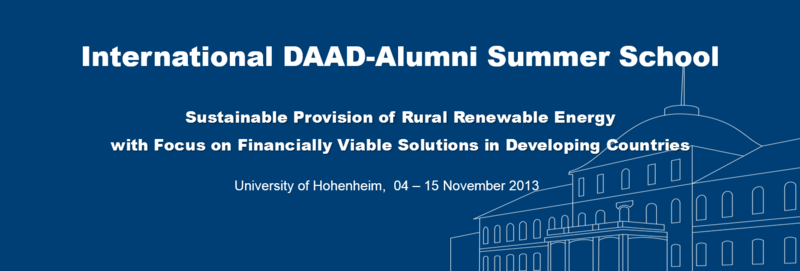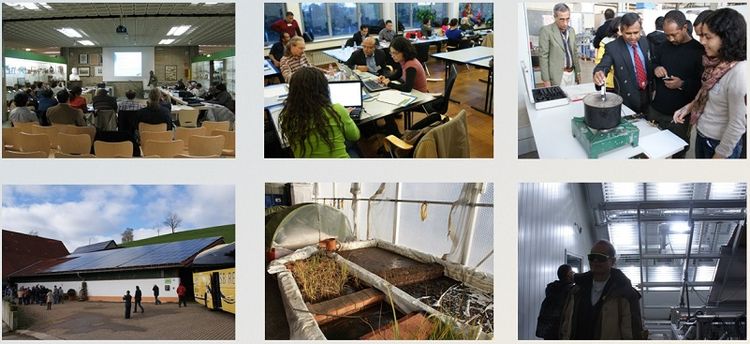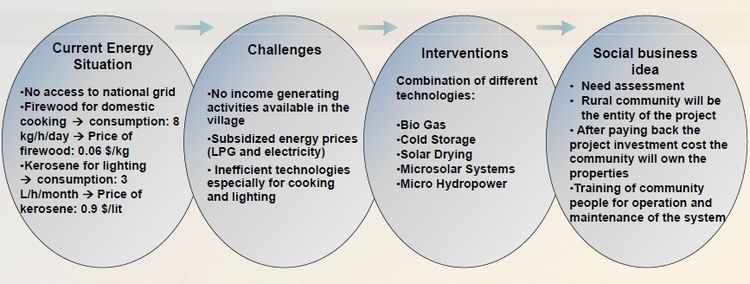Knowledge fuels change - Support energypedia!
For over 10 years, energypedia has been connecting energy experts around the world — helping them share knowledge, learn from each other, and accelerate the global energy transition.
Today, we ask for your support to keep this platform free and accessible to all.
Even a small contribution makes a big difference! If just 10–20% of our 60,000+ monthly visitors donated the equivalent of a cup of coffee — €5 — Energypedia would be fully funded for a whole year.
Is the knowledge you’ve gained through Energypedia this year worth €5 or more?
Your donation keeps the platform running, helps us create new knowledge products, and contributes directly to achieving SDG 7.
Thank you for your support, your donation, big or small, truly matters!
Difference between revisions of "International DAAD-Alumni Summer School - Sustainable Provision of Rural Renewable Energy with Focus on Financially Viable Solutions in Developing Countries"
***** (***** | *****) |
***** (***** | *****) |
||
| (14 intermediate revisions by 2 users not shown) | |||
| Line 10: | Line 10: | ||
{| border="0" cellspacing="3" cellpadding="0" align="center" style="font-size: 14px; width: 805px;" | {| border="0" cellspacing="3" cellpadding="0" align="center" style="font-size: 14px; width: 805px;" | ||
|- | |- | ||
| − | | style="width: | + | | style="width: 175px; text-align: center; vertical-align: middle; background-color: rgb(0, 63, 117);" | [[File:Icon - About.png|center|195px|About the International DAAD-Alumni Summer School, Sustainable Provision of Rural RE|alt=About the International DAAD-Alumni Summer School, Sustainable Provision of Rural RE|link=International DAAD-Alumni Summer School - Sustainable Provision of Rural Renewable Energy with Focus on Financially Viable Solutions in Developing Countries#About]] |
| style="width: 175px; text-align: center; vertical-align: middle; background-color: rgb(0, 63, 117);" | [[File:Icon - Programme.png|center|195px|Programme|alt=Programme|link=File:Programme - International DAAD Summer School 2013 - University of Hohenheim.pdf]] | | style="width: 175px; text-align: center; vertical-align: middle; background-color: rgb(0, 63, 117);" | [[File:Icon - Programme.png|center|195px|Programme|alt=Programme|link=File:Programme - International DAAD Summer School 2013 - University of Hohenheim.pdf]] | ||
| − | | style="width: | + | | style="width: 175px; text-align: center; vertical-align: middle; background-color: rgb(0, 63, 117);" | [[File:Icon - Participant.png|center|195px|Participants Presentations|alt=Participants Presentations|link=Participants Presentations]] |
| − | | style="width: | + | | style="width: 175px; text-align: center; vertical-align: middle; background-color: rgb(0, 63, 117);" | [[File:Icon - Speaker.png|center|195px|Speaker Presentations|alt=Speaker Presentations|link=Speaker Presentations]] |
|} | |} | ||
| Line 26: | Line 26: | ||
The results of the Summer School consist of concrete energy concepts for rural “energy villages” which will be presented at the <span data-scaytid="5" data-scayt_word="Agritechnica">Agritechnica</span> Trade Fair. A social and cultural program provides additional space for networking and discussions about future research cooperation. | The results of the Summer School consist of concrete energy concepts for rural “energy villages” which will be presented at the <span data-scaytid="5" data-scayt_word="Agritechnica">Agritechnica</span> Trade Fair. A social and cultural program provides additional space for networking and discussions about future research cooperation. | ||
| − | The | + | <br/> |
| − | + | ||
| − | + | = Rural Energy is more than Technology = | |
| − | + | ||
| − | + | To solve the energy problems in the not yet industrialized countries a whole new way of thinking is required. Although the potential is tremendous, technological solutions do widely exist and funding is often not a problem, progress is very slow.<br/> | |
| − | + | ||
| − | + | The aim of this DAAD Summerschool was to bring together energy experts from many different countries of the developing world to join forces in developing solutions for the existing similar energy problems. Besides the widely known approaches of development aid, research projects and for profit businesses a new and very innovative approach was introduced: SOCIAL BUSINESS.<br/> | |
| − | * | + | |
| − | + | Renewable energy technologies, research results, social business models and financing mechanisms were the topics of numerous presentations which equipped our participants with the necessary knowledge to develop their own new ideas for the introduction of proven technological solutions to their home countries. | |
| + | |||
| + | <br/> | ||
| + | |||
| + | [[File:Energypedia1.jpg|center|750px|alt=Energypedia1.jpg]] | ||
| + | |||
| + | = Results = | ||
| + | |||
| + | The 25 participants coming from 16 countries were divided in five groups with energy experts of different backgrounds in order to develop a social business that improves the economic activity of rural areas by the integration of cost efficient renewable energy technologies. | ||
| + | |||
| + | [[File:Energypedia2.jpg|center|750px|alt=Energypedia2.jpg]] | ||
| + | |||
| + | === <br/>'''Hosted by:''' === | ||
| + | |||
| + | University of Hohenheim (Stuttgart, Germany), [https://www.uni-hohenheim.de/institution/fg-agrartechnik-in-den-tropen-und-subtropen-12 Intitute of Agricultural Engineering / Agricultural Engineering in the Tropics and Subtropics]<br/> | ||
| + | |||
| + | Prof. Dr. Joachim Müller | ||
| + | |||
| + | Ms. Sabine Nugent | ||
| + | |||
| + | Ms. Katrin Pütz | ||
| + | |||
| + | Mr. Victor Torres Toledo | ||
| + | |||
| + | <br/> | ||
| + | |||
| + | === '''Financed by:''' === | ||
| + | |||
| + | [https://www.daad.de/entwicklung/hochschulen/alumniarbeit/08175.en.html German Academic Exchange Service (DAAD) - Alumni Special Projects]<br/> | ||
| + | |||
| + | <br/> | ||
| + | |||
| + | = Impressions = | ||
| + | |||
| + | *View pictures of the summer school [https://energypedia.info/wiki/International_DAAD-Alumni_Summer_School_2013_-_Impressions here]. | ||
__NOEDITSECTION__ | __NOEDITSECTION__ | ||
| Line 46: | Line 80: | ||
[[Category:Rural_Electrification]] | [[Category:Rural_Electrification]] | ||
[[Category:Rural_Development]] | [[Category:Rural_Development]] | ||
| − | |||
Latest revision as of 21:10, 25 February 2014
About
The International DAAD-Alumni Summer School - Sustainable Provision of Rural Renewable Energy with Focus on Financially Viable Solutions in Developing Countries is organised and hosted by the Center for Agriculture in the Tropics and Subtropics of the University of Hohenheim with financial support from the German Academic Exchange Service (DAAD).
The summer school is an opportunity to get together students, visiting scientists of German universities or former employees of German companies coming from developing countries to exchange knowledge and experience about current issues of rural energy provision in the participating countries.
The results of the Summer School consist of concrete energy concepts for rural “energy villages” which will be presented at the Agritechnica Trade Fair. A social and cultural program provides additional space for networking and discussions about future research cooperation.
Rural Energy is more than Technology
To solve the energy problems in the not yet industrialized countries a whole new way of thinking is required. Although the potential is tremendous, technological solutions do widely exist and funding is often not a problem, progress is very slow.
The aim of this DAAD Summerschool was to bring together energy experts from many different countries of the developing world to join forces in developing solutions for the existing similar energy problems. Besides the widely known approaches of development aid, research projects and for profit businesses a new and very innovative approach was introduced: SOCIAL BUSINESS.
Renewable energy technologies, research results, social business models and financing mechanisms were the topics of numerous presentations which equipped our participants with the necessary knowledge to develop their own new ideas for the introduction of proven technological solutions to their home countries.
Results
The 25 participants coming from 16 countries were divided in five groups with energy experts of different backgrounds in order to develop a social business that improves the economic activity of rural areas by the integration of cost efficient renewable energy technologies.
Hosted by:
University of Hohenheim (Stuttgart, Germany), Intitute of Agricultural Engineering / Agricultural Engineering in the Tropics and Subtropics
Prof. Dr. Joachim Müller
Ms. Sabine Nugent
Ms. Katrin Pütz
Mr. Victor Torres Toledo
Financed by:
German Academic Exchange Service (DAAD) - Alumni Special Projects
Impressions
- View pictures of the summer school here.























